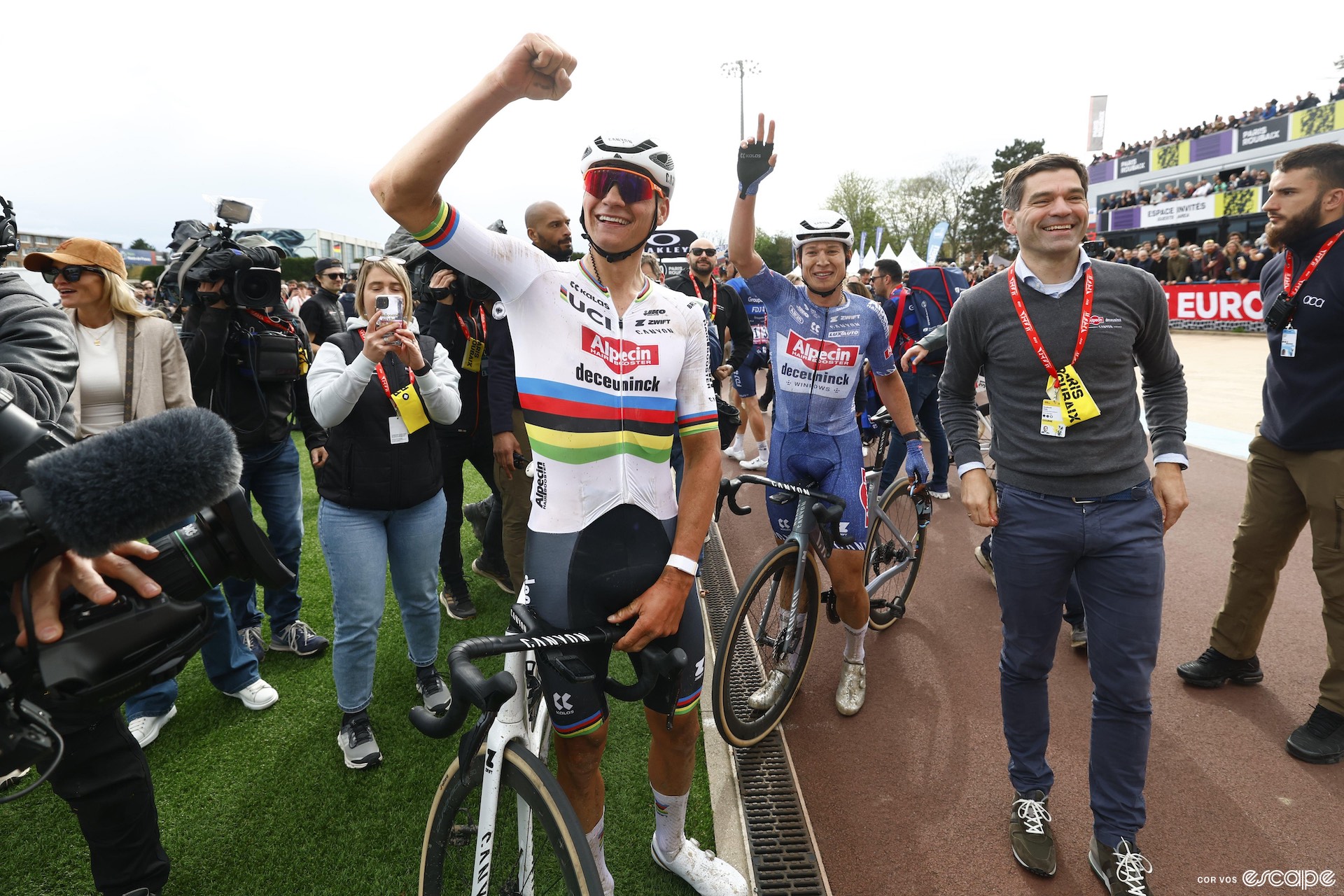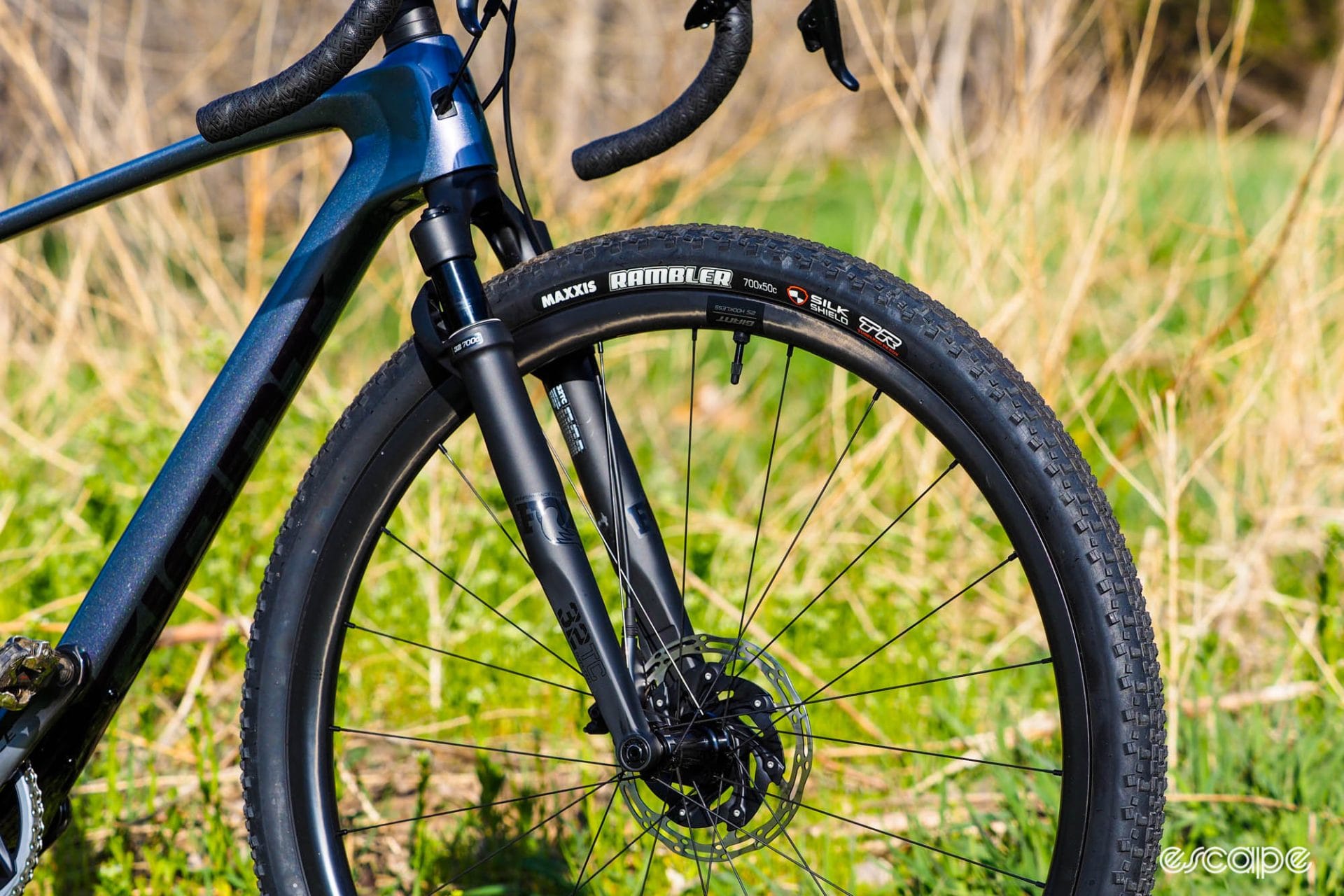Mathieu van der Poel's Paris-Roubaix ride on Sunday secured an achievement for his team that was hitherto unheard of in cycling: As Van der Poel crossed the finish line in the velodrome, Alpecin-Deceuninck became the first team in history to sweep the first three Monuments of the season. Amid all of that success, it's easy forget that Alpecin-Deceuninck was not even a WorldTour team two years ago.
Alpecin, which only jumped into the WorldTour ranks in 2023, was once defined by its lone superstar, but it wasn't Van der Poel who won the team's first Monument this year. The world road champ is undoubtedly Alpecin's standard bearer and he is at the height of his powers, but Milan-San Remo winner Jasper Philipsen and Gianni Vermeersch both shone brightly amid a dominant team performance at Paris-Roubaix, where Philipsen secured a one-two finish for the team for the second straight year.
"We started with the ambition of being having an impact on the one-day races," team co-founder Philip Roodhooft told Escape Collective from the infield of the Roubaix velodrome. "I think we succeeded."
If that's not an understatement, we're not sure what is. The Alpecin-Deceuninck organization run by Philip and his brother Christoph Roodhooft is one of the top teams of the Classics. As of publication time, the squad sits third on the UCI rankings, and there are still big one-days ahead. Van der Poel is a favorite for the upcoming Amstel Gold Race and might even race Liège-Bastogne-Liège. In short, the team has come a long way from its roots as the cyclocross-focused BKCP-Powerplus squad that first earned Continental status in 2014. Roodhooft said that he and his brother could not have anticipated just what heights they'd reach.
"It's not possible to expect something like this," Philip Roodhooft told Escape Collective. "Of course, we knew Mathieu was a big champion. This is even bigger than we could ever have expected."
Indeed, the squad's rise from the lower ranks to its current status is nothing short of remarkable in the modern racing environment. Countless third- and second-division teams have WorldTour aspirations, but Alpecin's emergence has no parallel in the peloton. The more common outcomes for recent WorldTour hopefuls are failure or middling success at best.
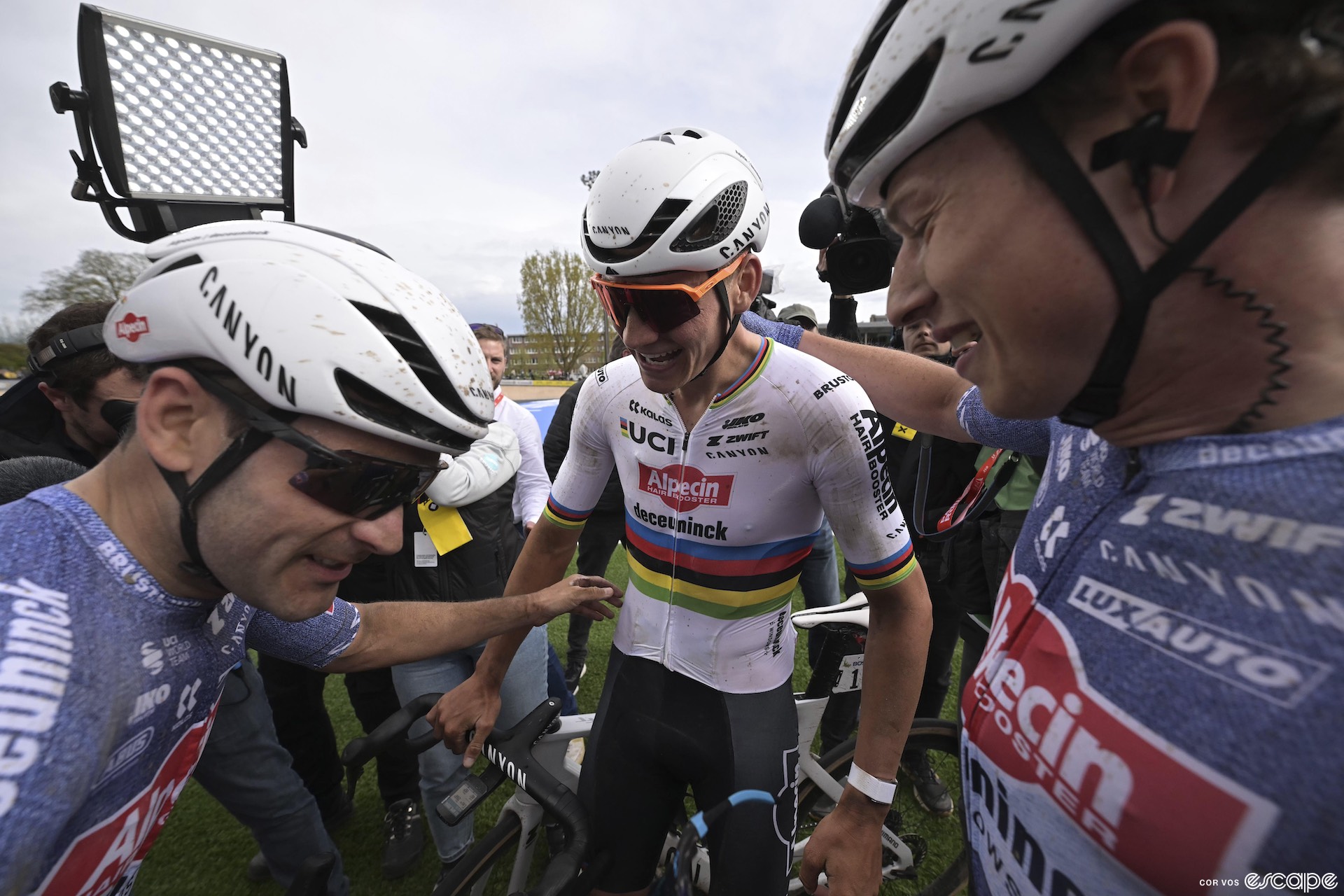
The MTN-Qhubeka project that spent a few years as the WorldTour-level Dimension Data team before folding and the upstart Israel-Premier Tech team that rose to the top division only to then be relegated back to the second division represent the opposite end of the spectrum from what Alpecin has done. Meanwhile, other recently elevated squads like Arkéa-Samsic, Cofidis, and Intermarché-Wanty are doing a bit better than that, but they aren't exactly lighting things up on the WorldTour.
In general, it is the established squads that continually enjoy results at the highest level. The other teams that seemed strongest this Classics campaign, Visma-Lease a Bike and Lidl-Trek, have been around for a very long time. So too has Soudal-QuickStep, the team that led the way in the one-day races for so long before falling off their perch just as Alpecin began to emerge.
Roodhooft, his brother, and the team they run have managed to find success where others have failed, and while the longterm investment in Van der Poel is at the heart of that, it's not the only thing that has propelled them to their current level – not that Roodhooft can actually pinpoint just what it is that sets their approach apart.
"I really don't know what we do differently," he said.
"Of course, I only know what we do, and we just do it every day. We just work every day, but I think to be honest, also the others do that, so there's no magic in it. It's just working, thinking, taking risks, unfamiliar risks, and trying to do these things right. And then, I'm not saying you need luck, but bad luck is something you shouldn't have."
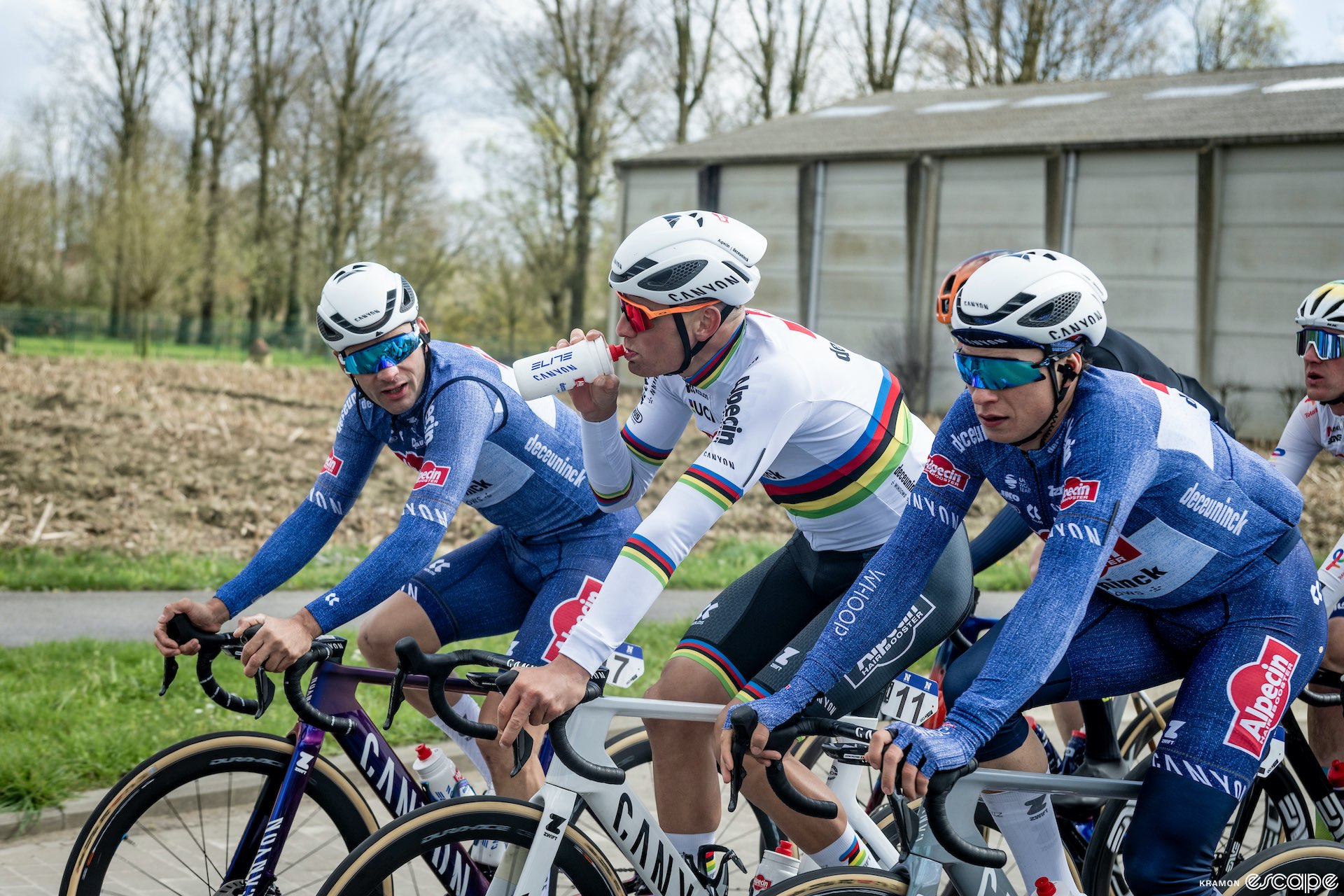
The crashes that derailed the Classics campaigns of Lidl-Trek and Visma-Lease a Bike certainly played a role in Alpecin's success this season, but crashing is a part of the sport, and Alpecin's consistent success can't simply be viewed as an accident. Beyond the obvious role that Van der Poel's brilliance has played, another identifiable building block has been the team's acquisition and development of the talent around him. Alpecin has worked with Vermeersch across two stints dating back to his 'cross days, and the squad has also done quite well for itself signing riders who had found early success elsewhere like Philipsen, Kaden Groves, Quinten Hermans, and Tim Merlier (who has since moved on to Soudal-Quick Step).
"I can only say we've been working 15 days years now for it, day-by-day, the both of us," Roodhooft said. "Then with the years we've been able to attract people helping us in the process because you start low, and then you need others to help, and not only to help but to bring in knowledge, to bring in things in specific domains who know better than we do. But I think it's also a quality of bringing the right people together and getting them motivated and passionate about the projects we started and where they feel now they are genuinely all part of it. I think that's an important element."
In short, the Roodhooft brothers got in on the ground floor with Van der Poel, and they have progressed from there, leveraging Van der Poel's presence to help attract newcomers.
Now, the dual threat of Van der Poel and Philipsen is a driving factor in the team's spectacular results, and Roodhooft attributes the success of the pairing to their "complementary profiles." Philipsen, the reigning Tour de France points champion, has a more sprint-oriented skillset, while Van der Poel is one of the premier solo artists in the peloton – but it must be said that both riders certainly have some overlap in their abilities and especially in their objectives.
The looming question for Alpecin is how to sustain all this success when Philipsen's contract runs out at the end of the year. Over the past several weeks, the rumor mill has suggested that Philipsen intends to move on from the squad that recently made a very, very long-term commitment to Van der Poel. On Thursday, however, Het Laatste Nieuws reported that Philipsen might not be leaving after all. For now, nothing is certain.
In any case, it does make sense for Philipsen at least to consider moving on, seeing as he is a star in his prime who probably wants to see how he fares as the sole leader of his team rather than as part of a multi-pronged approach.
Philipsen's own ambitions were a topic for conversation in his post-Roubaix press conference, where one journalist pointed out, "I thought you don't like second places," to which the 26-year-old Belgian replied diplomatically, "Today, I do."
Philipsen was pressed on whether he aimed to win the race some day, and he did his best to be avoid saying anything too controversial – but also made his own aspirations apparent.
"Yeah, why not?" he replied. "It's a race I really love to race. It's a race that motivates me. I really liked the ride on the cobbles. So yeah, why not? Today it was clear that there was one guy who was really outstanding, and it was was my teammate. I'm really happy with the team performance."
In any case, Alpecin's handling of the upcoming transfer season is a problem for later. For now, there are big targets ahead. As of publication time, both Philipsen and Van der Poel are slated to ride together again at the upcoming Amstel Gold Race, where Hermans and 2023 signing Søren Kragh Andersen will further bolster the Alpecin squad's status among the top teams in the event. Beyond that, the team has more aspirations as Grand Tour season gets underway.
In other words, don't expect Philip Roodhooft, his brother, and their stars to rest on their laurels, as beautiful as those laurels might already be amid a smashing start to 2024.
"There are still many other things to win," Roodhooft said, "and many things to repeat as well."
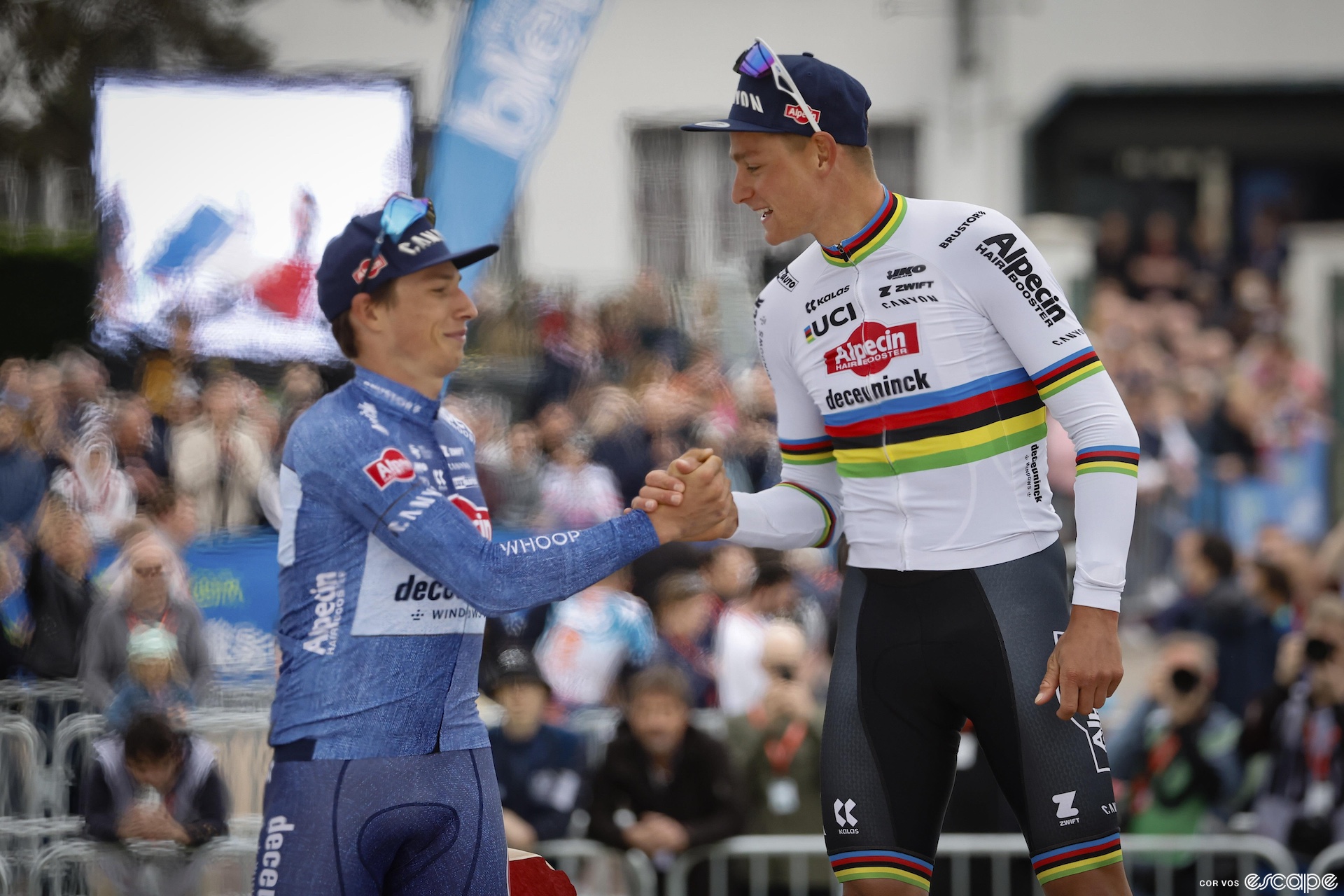
Did we do a good job with this story?

